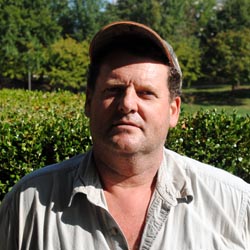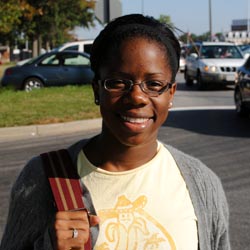 |
|||||
| Politics | Business | Schools | Justice | Health | Et Cetera |
By Bobby McMahon (For the non-texters, the acronyms above stand for "by the way," "laughing out loud," and "talk to you later.") Regardless of texting IQ, a state law prohibiting most cell phone text messaging while driving went into effect Thursday. The law was approved by the General Assembly last session, and lawmakers and highway officials hope it will increase driver attentiveness and decrease traffic accidents and deaths. "There's just no way a person can use both hands on an electronic device and focus on a conversation and at the same time drive safely," said Sen. Jamie Raskin, D-Montgomery, a co-sponsor of the bill. "It makes no sense." Texting is one of the most distracting things a driver can do behind the wheel, said Dr. John Lee, an engineering professor at the University of Wisconsin-Madison. Speaking Wednesday at the Distracted Driving Summit, a two-day conference organized by the U.S. Department of Transportation in Washington, Lee said texting was "the perfect storm" of distraction because it takes the driver's eyes, hands and brain off the road. "I'm sure there are worse things [than texting], but it's hard to imagine them," Lee said. Dr. Tom Dingus, director of the Virginia Tech Transportation Institute and another speaker at the conference, cited a study demonstrating just how hazardous texting and driving is. Examining drivers over the long term and in real driving conditions, the study found that drivers are 23 times more likely to have an accident or near accident while texting than during normal driving. "Cell phone texting in particular has the potential to create a true crash epidemic if the popularity grows exponentially," Dingus said during his presentation. "We really need to get the message out that those activities are really, really bad." In Maryland, more than 30 percent of the roughly 95,000 traffic accidents last year resulted from distracted driving, according to the Maryland State Highway Administration. While this includes not only texting but also eating and talking on a cell phone, Lori Rakowski, spokesman for MSHA, said it's "impossible" to text and drive safely at the same time. "Clearly, distraction plays a major role in crashes," Rakowski said. "The texting law sends a positive message that drivers should avoid distractions and focus on safe driving. Officially the Delegate John Arnick Electronic Communications Traffic Safety Act, the texting ban passed overwhelmingly in both the House and Senate during this spring's session. Drivers can be pulled over by the police if they're suspected of texting and face up to a $500 fine if convicted. Maryland joins 18 other states that have already outlawed texting, with nine additional states banning the practice for young and inexperienced drivers. While the law only prohibits writing and sending text messages -- reading them is still legal -- Maryland State Police spokesman Elena Russo was confident that police would be able to tell the difference. "Like everything else, people are going to be blatant about texting and driving," Russo said, noting that a driver writing a message is clearly distinguishable from one who is merely reading one, particularly with the full keyboards offered on many cell phones. "You can tell when someone is texting while driving." Beyond enforcement, bill sponsor Sen. Norman Stone, D-Baltimore County, believes that simply passing the law will inform drivers that texting and driving is dangerous. "We're hoping that, as a matter of policy, we'll get the message over and people will stop doing it," Stone said. "The idea is to try to save some lives." With the texting ban in the books, both Stone and Raskin expressed hope that the Legislature can pass a law prohibiting the use of cell phones without a hands-free device in the upcoming session. Last May, Gov. Martin O'Malley issued an executive order requiring state workers to use a hands-free device to make calls while driving. "This is a preventable kind of disaster," Raskin said. "I'm proud that the state has gone this far in enacting [the texting ban], and I hope we go further next session." |
||||||||||
|
Copyright © 2009 University of Maryland Philip Merrill College of Journalism | ||||||||||
| Politics | Business | Schools | Justice | Health | Et Cetera | |||||


